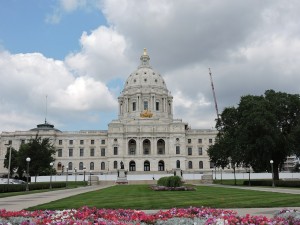Minnesota Environmental Partnership
Legislative Wrap-Up 2017

Summary
This legislative session failed to do more to protect the resources that Minnesotans value.
Dozens of detrimental provisions were advanced. Through a tremendous effort by citizens across the state, many were dropped. But others became law. The legislature also missed opportunities to protect pollinators, invest in water protecting crop research, and adequately fund transit and transportation.
Initiatives
Minnesota Environmental Partnership priorities for the 2017 legislature included:
Forever Green: Provide long-term funding to the University of Minnesota.
Forever Green – an innovative University of Minnesota research program developing new cover and perennial crops to improve soil health and water quality – has received $1 million each year since 2014. The University is ready to expand its research but needs long-term funding at a higher level in order to meet the promise of this field.
Outcome: Forever Green was provided $1.5 million in funding over the next two years from the Legacy Amendment’s Clean Water Fund. This is 75% of the funding provided in previous annual appropriations.
Protecting Pollinators: Support the MN Department of Agriculture’s goals to
- Track and regulate neonicotinoid-treated seeds; and
- Fund pollinator conservation with a fee on the sale of harmful pesticides.
Outcome: Neither proposal passed. Legislators did appropriate $1 million in one-time funding to create a pollinator habitat and research account for the University of Minnesota. While this is useful, it does not substitute for the critical research that would have been funded by the pollinator protection account. It also is one-time funding that comes at the expense of other natural resource projects across the state and falls far short of an ongoing fund supported by fees assessed on sales of pesticides.
Legislators also weakened existing pesticide law by adding that an appropriately licensed person “is not required to verify, document or otherwise prove a particular need prior to use, except as required by the federal label.” While the impact of this language is not entirely clear, it could hinder the Department’s ability to implement measures to protect pollinators in the future.
Transportation: Pass balanced, comprehensive funding that increases long-term state-wide investment in all modes of transportation.
Outcome: The transportation bill that passed scales back lawmakers’ most extreme attempts to cut funding for Metro Transit, but creates budget problems that could cripple the metro bus system in just two years. The bill provides no new dedicated funding for safe biking and walking, and leaves Greater Minnesota transit systems with dwindling resources to meet current and future needs. Fare increases have been proposed.
Capital Bonding:
Clean-up St. Louis Estuary Area of Concern: Fully funded with $25.4 m.
Modernize aging drinking and waste water systems: $116.9 m. bonded ($167 m. requested).
Conservation Reserve Easement Program: $10 m. bonded ($45 m. requested).
Defense
The following proposals passed and will move Minnesota backwards:
- Diverting $22 million of Legacy Amendment Clean Water funds for ongoing general operations of local Soil and Water Conservation Districts while cutting on-the-ground water quality projects.
- Giving certain water treatment facilities 16 years to delay complying with water quality standards.
- Giving special status to landowners in contested case hearings on proposed mining operations.
- Prohibiting local governments from banning plastic bags.
- Weakening protections of rare calcareous fens.
- Removing the PCA requirement to adopt air quality and environmental review standards for frac sand operations.
- Beginning the permit review process before evaluation of environmental impact data is complete.
- Allowing corporations to prepare their own draft Environmental Impact Statement and buy their way into an expedited permit.
- Interfering with science-based forest management at Sand Dunes State Forest.
- Placing a 2-year prohibition on the adoption of rules limiting lead shot.
- Eliminating Public Utilities Commission (PUC) safeguards from price gouging by utilities serving rural residents who want to use solar or wind power.
- Allowing Xcel Energy to build a natural gas plant in Becker, Minnesota without going through the usual Public Utilities Commission (PUC) approval.
- Providing Xcel Energy with $54 million from the Renewable Development Fund to buy out and shut down biomass generating projects.
- Exempting small utilities from participating in energy savings and efficiency programs.
- Weakening 1.5% Solar Energy Standard for medium sized utilities.
- Repealing Minnesota’s goal, framework, and planning strategy for a 100% renewable energy future. (Laws 2013 chapter 85, article 12 sec 1.)
These harmful proposals were approved by either the House or Senate, but did NOT become law:
- Unraveling buffer requirements: No major changes were made to the state’s buffer laws.
- Significant cuts to agency budgets.
- Doubling the size a proposed feedlot can be (up to 2,000 animal units) before environmental review is triggered.
- Weakening local control by changing interim ordinance rules.
- Creating additional layers of review and judicial process, and eliminating deference to agency scientists, in order to get around pollution protection standards.
- Suspending water quality standards implemented between mid-2014 and 2019, including water eutrophication standards.
- Exempting pipelines from the Public Utilities Commission’s Certificate-of-Need process.
- Prohibiting consideration, in any environmental review, of alternate routing of pipelines that does not include the applicant’s preferred start and end points.
- Bypassing all oversight of, and allowing immediate construction of Enbridge’s Line 3 tar sands oil pipeline after July 1, 2017.
- Allowing counties to adopt “no net gains” of public lands rules.
- Efforts to limit the jurisdiction and discretion of the LCCMR in selecting future projects.
- Significant changes in projects approved by the Lessard-Sams Outdoor Heritage Council.
- Politicizing the appointment of Public Utilities Commissioners.
- Eliminating the Legislative Water Commission.
- Eliminating the Environmental Quality Board (dropped before reaching the Senate and House floors).